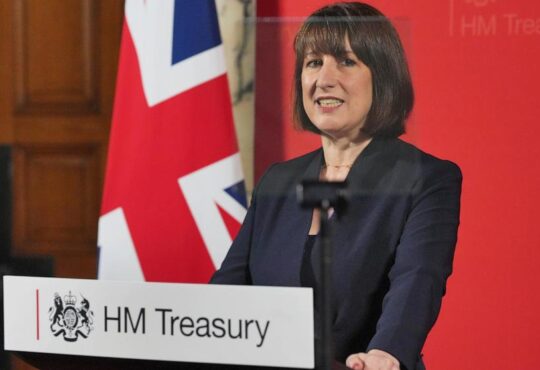
When UK chip-designer Arm’s stock price surged 25% on the first day of trading after its bumper $5.2bn IPO on 14 September, it could have been the City toasting its success.
Instead, the spoils went to Wall Street. Arm and a flurry of other internationally focused UK companies have chosen New York over London to list in recent months, highlighting the ongoing challenges facing the UK’s capital markets.
“The listing of Arm was a milestone day for Nasdaq, being the largest IPO of the year, and the deal that has signalled an awakening of the IPO market after a two-year hiatus,” said Karen Snow, global head of listings at Nasdaq.
It was a fresh blow for the City, which is in the midst of a two-decade low for listings. That has led many to call for a fundamental overhaul of its capital markets.
The UK is battling not only a drift of high-profile IPOs to the US, but also fallout from Brexit. The latter has led to fragmentation in Europe and deep-seated structural issues that an ongoing succession of reviews and committees have looked to address.
READ ‘London is nowhere near as broken as some would say’
The government and key City figures have unveiled a series of reports and created several groups this year designed to tackle the UK’s international competitiveness as growth stalls.
Even before Arm’s stateside switch, the UK was struggling to stem the tide of criticism that London’s appeal as a listings destination was on the wane.
Breaking the doom loop
This year’s Mansion House speech in July focused on measures to bolster UK capital markets — the latest of a succession of moves designed to kick-start growth in the City, following the Edinburgh Reforms last year.
“We’re concerned about the assumption that the package of reforms to date are collectively the silver bullet for UK competitiveness,” said Conor Lawlor, managing director of capital markets and wholesale policy at lobby group UK Finance.
“They make the UK a better place to run a business, but they don’t make the UK immediately a more attractive place.”
Xavier Rolet, the former CEO of the London Stock Exchange, said that looking at the current issues ignores “decades of consistently punitive fiscal and regulatory policies against equity markets”.
“We’ve been in a doom loop, which has just been too often a prevalent narrative ever since Brexit, and we need to stop it,” said Mark Austin, a partner at Latham & Watkins and chair of the UK’s secondary capital raising review.
“It can become a self-reinforcing narrative,” he added. “It can become the perception and then perception can become reality, even though it is very often not actually true.”
As well as Arm, British chip-designer Imagination Technologies is also heading to New York, having registered to go public in the US, The Telegraph reported.
It is following in the footsteps of CRH and Ferguson — two FTSE 100 constituents that grew up in the UK, but chose to move their primary listing to New York.
There are plenty in the City who believe that focus on tumbling UK IPO volumes is simply a media storm that ignores a global slump in listings, which raised just $265.6bn over the past two years, according to data provider Dealogic. The UK will regain its fair share once activity returns, they believe.
They also argue that although big-ticket listings have chosen the US, London remains the natural home for many UK companies, particularly those in high-growth sectors such as technology.
READ Arm’s successful US IPO shows why London still needs a hand
However, Alasdair Haynes, chief executive of Aquis Exchange, said the negative outlook was based on fact.
“The media like to hear stories both good and bad. The fact is very clear: the UK is losing businesses to the US,” he said.
Rolet said that there was a disincentive for UK companies to use public markets to raise funds, with an over-reliance on “heavily subsidised” bank lending.
“It is sadly not a funding model compatible with the scaling up of high-growth tech startups to global relevance,” said Rolet.
“Blaming the stock exchange or looking at quick and superficial technical gimmicks is unlikely to move the dial.”
Brexit’s negative effect
The City continues to suffer a significant hangover from Brexit. That has dented London’s reputation as a global financial centre as well as presented an opportunity for EU cities to make a land-grab for both assets and talent. Meanwhile, US-headquartered banks have shifted more resources back to their home market. That is a trend the current listings drought reflects.
“The UK is dealing with the consequences of Brexit,” said one exchange executive. “Before, London was the gateway to Europe. For some international listings that would have listed in London, there is now a stronger case for them to go to NYSE or Nasdaq.”
The London Stock Exchange does still raise more equity capital than any other European stock exchange. But it last competed with New York as the top IPO destination globally in 2008. And while the world’s biggest banks and fund managers may have dispersed their operations across Europe after Brexit, there are few signs that continental exchanges have become more competitive. Instead, capital is simply moving to the US, according to interviews with three top exchange executives.
“We have not seen a trend where issuers that may have been looking for a London listing are now considering listing on the continent,” said one.
Instead, it has made London a tougher sell against New York.
“There are two big winners because of Brexit,” said Austin. “One is New York being perceived as the default global capital market; it hasn’t been Amsterdam, Paris or Frankfurt. The second is private markets.”
READ Why we must add some risk again to breathe life back into the UK stock market’s returns
While 2021 was a bumper year for IPOs and London maintained its position as the top listings venue in Europe, in recent years it has been dwarfed by capital raised in the US.
New York enjoys several advantages, including servicing a US market that makes up more than 40% of the $109tn global equity market.
Nasdaq’s Snow said the exchange had the “single deepest liquidity pool in the world”. She added that it competes “rigorously” for every IPO.
Russia’s invasion of Ukraine last year came amid surging inflation and rising interest rates, all of which contributed to volatile market conditions that do not favour equity capital markets.
Last year was the worst IPO market for the UK in two decades, with 26 main market IPOs raising around $1bn. This year is shaping up to be only slightly better in terms of value, with $914m raised through eight listings so far.
The US has not fared much better, with the New York Stock Exchange and Nasdaq suffering their worst year since 2008. But London has also suffered high‑profile IPO flops, with Deliveroo, Wise, The Hut Group and CAB Payments all seeing sharp declines in value after going public.
“If all you are hearing about is there have been a couple of deals and they have all gone badly, it doesn’t give you the confidence you need,” an exchange executive told Financial News.
For many growth companies, the scrutiny of public markets is a disincentive to list. Increasing numbers have therefore decided to remain private to take advantage of greater availability of capital from private investors — 24 firms worth just over $14bn collectively went private in the UK this year. In 2017, 10 firms went private for $2.4bn. Even in the bumper IPO year of 2021, 22 worth $40.7bn went private as opposed to 49 firms who IPOed in London in offerings valued at $17.4bn.
“If they have the choice to wait, they choose to wait. There’s still a lot of money in private equity firms,” another exchange executive told FN.
Craig Coben, former global head of ECM at Bank of America, said there was a “structural shift” in favour of private ownership. He said this stems from “many factors, ranging from low interest rates (until recently) to increasing regulation and political scrutiny of publicly-listed stocks”.
Rising optimism
Next year is likely to be the litmus test of how far UK capital markets have fallen. Many in the City are expecting a rebound in IPOs, which will test the theory its woes come simply from market conditions.
In the EU, exchange bosses remain convinced that the rebound will see domestic companies choose their local markets to list.
Stefan Maassen, head of capital markets at Deutsche Börse, said that recent listings in Frankfurt, are increasing optimism. Last year, Porsche raised about €9.4bn and medical glassmaker Schott Pharma is looking to raise close to €1bn in its upcoming IPO.
“It is about creating the right interest and demand. The valuation will be set by investors. An investor is not willing to pay more just because it is a US listing versus a European listing,” he said.
READ Don’t lose hope on London listings
The level of scrutiny around the UK’s capital markets shows that the government and the City are at least committed to trying to make changes. London also retains its fair share of cheerleaders who believe it remains attractive.
“The work of government and regulators, alongside the industry, to further improve the UK’s competitiveness and ensure it remains the leading destination for companies to grow, scale and stay remains a key focus for all of us,” said Charlie Walker, deputy chief executive of the London Stock Exchange.
Julian Morse, co-CEO of Cavendish, said the broker had a strong pipeline of small and mid-cap firms looking to list next year in London. He added that firms have got used to uncertainty, resulting in discussions picking up recently.
“Companies want growth capital. They might want to wait for better conditions, but it is better to get slightly less capital now and grow than wait a long time for things to improve.”
Meanwhile, listing in New York will not suit everyone, said Coben.
“There are several downsides to listing in the US, including higher litigation risk and the fact that European companies risk being orphaned by investors when they list in the US unless they have a durably strong institutional following,” he said.
“Most companies should list in their home market. A global powerhouse like Arm is very much the exception that proves the rule.”
Austin said London needs to promote the fact it already has many of the ingredients needed for a global financial centre.
“The amount of goodwill that there is around London is pretty pronounced. There is a long list of companies that want to list in London but have been swayed by the bright lights and the talk in recent times to New York. All these companies want an excuse to list in London. We have just got to give them that excuse.”
To contact the author of this story with feedback or news, email Jeremy Chan






